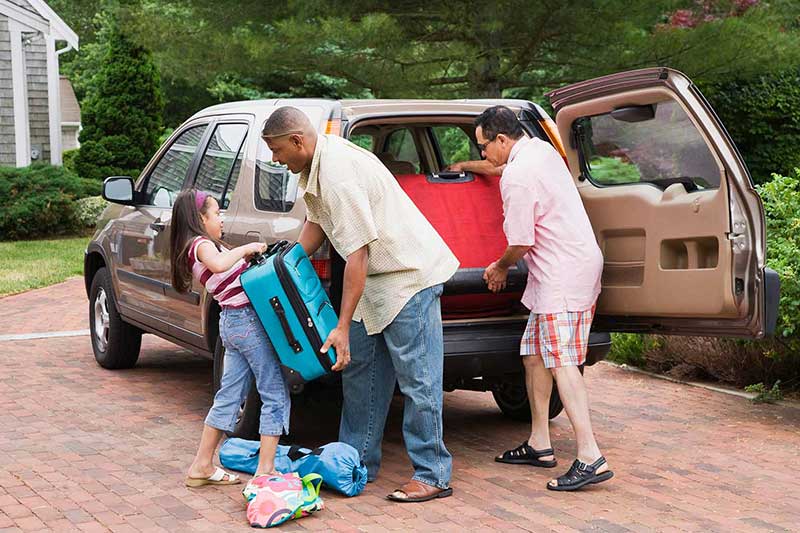Navigating Difficult Food Talk Around Holidays
We all celebrate differently, but holidays usually have one thing in common—food! Whether it’s new food, comfort food, cultural food or sweets and treats, food is often part of how we express love and pass on traditions. It’s no wonder many gatherings center around the meal.
But we all view food differently. For some, it brings a sense of comfort or joy. Others may find it more stressful. Parents and caregivers may feel pressure related to how friends and family members view their child’s eating habits. If that sounds familiar, know that it’s normal and OK to feel anxious about holiday food pressure, and that you’re not alone. Our experts are here with tips to help you and your children navigate food stressors at your next holiday.
In this article:
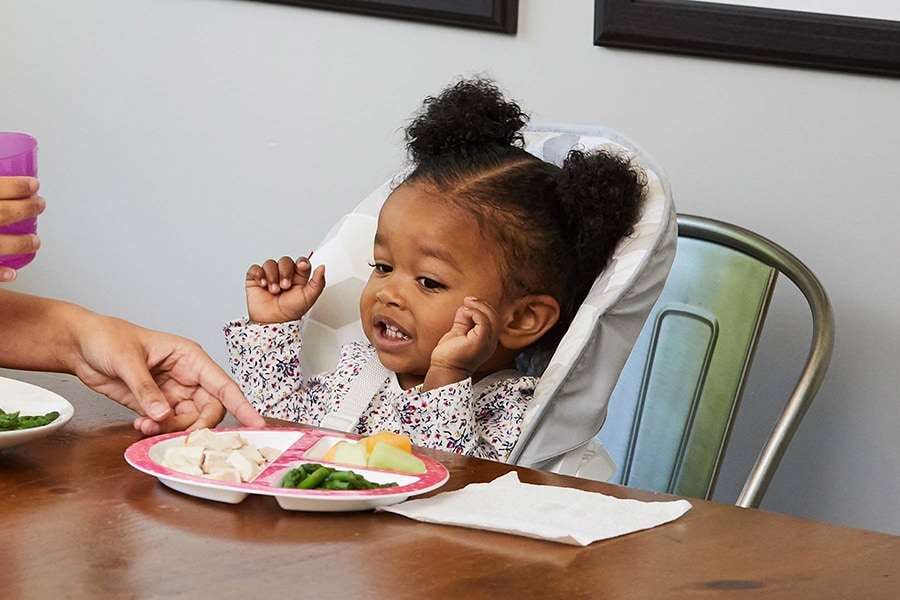
Why are my child’s eating habits different around holidays?
There’s a lot that goes on during the holidays that can affect our mood, choices and behavior. All this can affect our eating habits, too.
Reasons kids may not eat at holiday gatherings:
- Being overstimulated. Lots of people are gathered. There’s background music playing. The TV has been on all day. Your child’s senses may be overloaded by all these sights and sounds. And when you’re overwhelmed, it can be hard to perform normal tasks, like eating.
- Wanting to play. The cousins are in town and school break means there’s more time to play with friends! Your child may be having so much fun they simply don’t want to stop and eat.
- Others’ influence. Your kids see that others are eating, or not eating, certain foods. They may want to go along with what others are doing.
- New and changing routines. Being out of your normal daily routine can affect your eating habits. Your child may or may not feel hungry at the same times.
- New food. There are most likely foods that look, smell, taste or even feel different from what your child is used to. They may be excited to try new things, or they may feel nervous about what’s on their plate.
- Experiencing multiple emotions. All the above play a role in how your child is feeling, and they may experience many different emotions over one holiday. Whether they’re excited, happy, shy, scared or worried, emotions may affect the way your kiddo feels about eating.
With so much going on, it makes sense our eating habits change around a holiday. Remind yourself that this is normal and do your best to give your child—and yourself—a little extra grace.
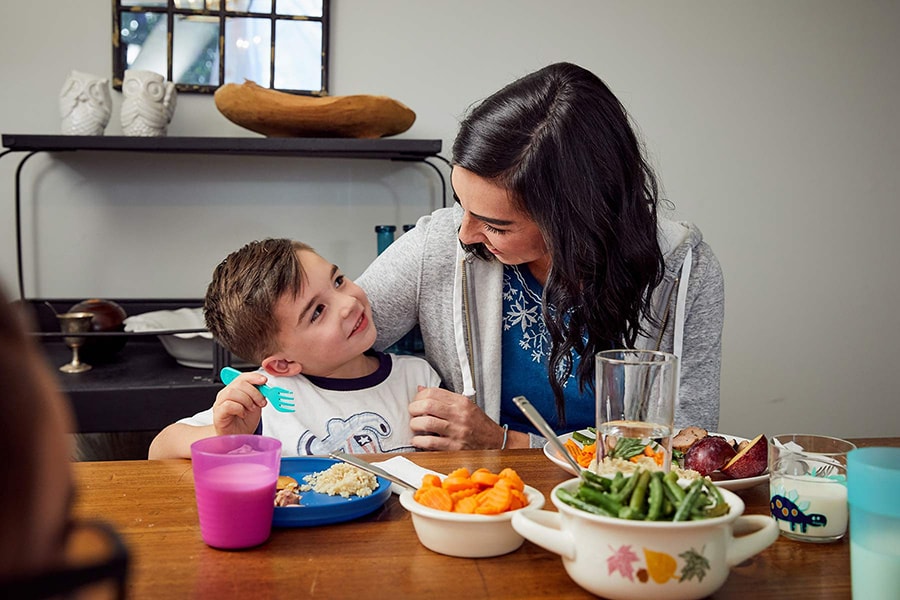
Being mindful of how we talk about food
Many of us grew up hearing phrases like, “clean your plate” or, “eat at least 2 bites.” If so, it makes sense that you might be using these phrases with your own children. What we may not realize is that regularly saying these phrases puts pressure on our children to eat, which can lead to mealtime stress and power struggles. Children may feel even more pressure on a holiday when grandparents, aunts, uncles and friends are using these phrases, too.
Here are some ways we can shift our mindset when it comes to food during the holidays:
| Instead of … | Try … |
|---|---|
| “Finish your green beans before having another roll.” | Saying nothing. Holidays can be overstimulating and kids may only want to eat familiar, comforting foods. And that’s OK! They may be more comfortable eating other foods tomorrow. |
| “No pie until you clean your plate.” | Offering dessert with the meal. Putting dessert on the same plate with the rest of the meal (when dessert is on the menu) helps de-value sweets. In other words, with regular practice, kids can start to view dessert as “just food” and not a reward that requires us to act a certain way or perform a certain task. Viewing dessert as “just food” helps kids build a healthy relationship with food. |
| “You’ve had too many brownies today. Go run around outside.” | Positive redirection. It’s normal to think about setting healthy limits. But telling a child to be active because of what or how much they eat can damage their self-esteem and create a negative relationship with food. Instead, encourage a redirection to get some fresh air together or make up a new game with the cousins. Don’t bring food into the conversation. This way, movement is about having fun and spending time together. |
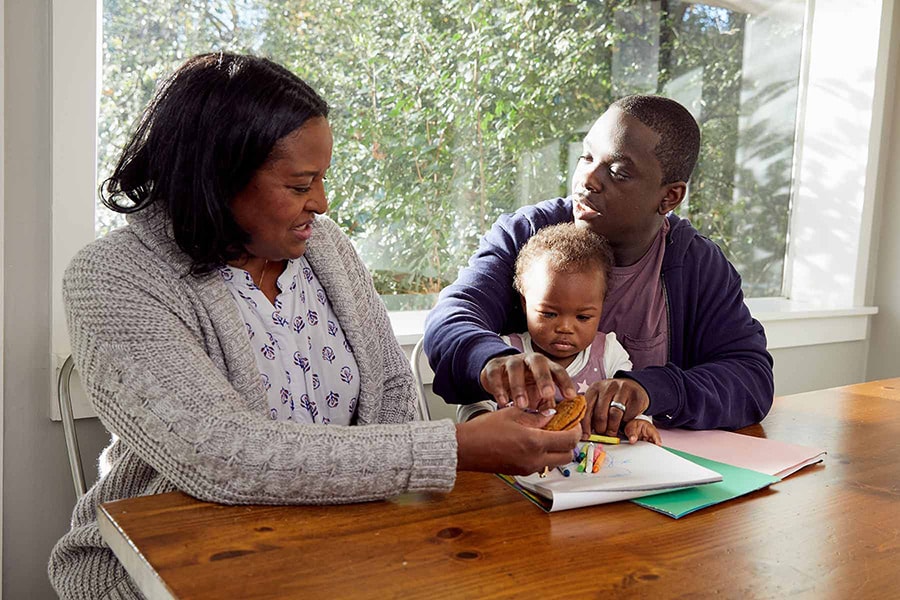
How to respond when others comment on your child’s eating
Your child may not always be able to speak up for themselves when someone comments on their eating habits, especially when they’re young. But as the caregiver, it can be hard to confront family or friends when they say something about what or how much your child is eating. Keep in mind, the person commenting may not realize they’re saying something upsetting, or something that goes against your family’s values.
Here are some things to consider when navigating these difficult conversations:
- Think about when you will talk to this person. Often, we don't address something until it happens. The challenge is we might not always respond the way we want to in the heat of the moment. Instead, consider having a proactive conversation. Think about when would be the most effective time. Is it a day or two before the holiday or the day of?
- Think about where you will talk to this person. Consider having a private conversation, away from your child and others, so that both of you can hopefully be present and receptive.
- Think about your approach. Are you in a place to have a calm, meaningful and productive discussion? If the answer is no, you may want to wait. Take a breath, give yourself some grace and bring it up later when you’re in the right headspace. If the answer is yes, be mindful of your tone and body language. Remember, the person you are speaking to might be completely unaware of how their comments are making you and your child feel. Whenever possible, lead with positivity.

Here are some examples of what to say in a private conversation:
- “We’re encouraging our child to listen to the way their body feels. This includes when they’re hungry and full. Would you be open to helping us with this? Let’s make an effort to not comment on how much food they eat. And as parents, we will step in if we see something is not right.”
- “I’m working on building my child’s decision-making skills and mealtimes are a great time to do this. I would love your help with this. Let’s be intentional about letting them decide what and how much to eat.”
Here are some examples of what you could say in the moment:
| Family/Friend says: | Respond with: |
|---|---|
| “Make sure you try everything! Auntie worked hard on this meal.” | “Auntie, thanks for all your hard work on this delicious meal. Our child is still exploring foods, so we’re OK with them picking and choosing what they want to eat today.” |
| “You have lots of food on your plate, but you’re only eating potatoes. You need to eat the other foods too.” | “Today is a bit different from our regular daily routine. I’m OK letting my child decide what foods they do and don’t want to eat out of what is being offered.“ |
| “They’re so picky! You need to make them sit there until they finish their food.” | “Our child is still learning about and exploring different foods, and we’re OK with that.” |
Ways to help your child prepare for holiday food conversations
As your child ages, it can be helpful to teach them how to respond to grown-ups’ comments about their eating habits. Having this conversation a couple days before the holiday will give them time to build confidence.
Here are some phrases you can practice with your child:
| If someone … | … respond with: |
|---|---|
| Says to try a certain food you don’t like | “No, thank you.” |
| Says to eat more food when you feel full | “No, thanks. I’m all done.“ |
| Asks if you like a certain food, but you don’t | “It’s not my favorite, but I’m enjoying the [food I do like].” |
Helping your child find and use words to express their feelings helps build their confidence and improve communication skills so they can speak up for themselves.
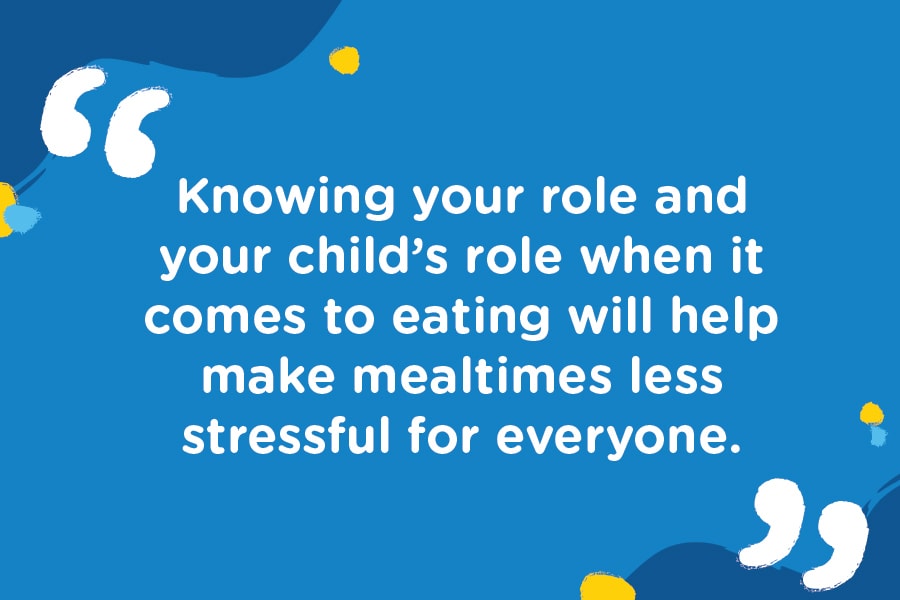
How to let go of eating expectations
Holidays carry lots of emotions that can affect the way your child eats. Knowing your role and your child’s role when it comes to eating will help make mealtimes less stressful for everyone, even when it’s not a holiday! Mentally and emotionally preparing yourself for everything we’ve discussed, like new foods and changing routines, goes a long way in helping everyone enjoy their holiday.
To help your child feel less holiday food pressure, try some of these tips:
- Let your child eat before leaving or having people over.
- If you’re going to a gathering, bring foods your child is familiar with.
- Let your child decide what and how much to eat from what is being offered.
- If there is loud music, lots of talking, or if screens are present, consider eating with your child in a more quiet and calming space.
Reviewing these tips will help you navigate the fun, excitement and, yes, stress, that a holiday brings. As you focus on your child’s wellbeing, be sure to make time for your own needs as well. As caregivers, we often put a lot of pressure on ourselves, especially around a holiday.
Remember that it’s normal and OK to feel stressed. In those moments, consider taking a calming walk outside or stepping into a quiet room to gather your thoughts or take some deep breaths. Practicing healthy coping skills will not only help you handle life’s ups and downs, but it also sets a great example for your little ones. And that’s something to celebrate!


